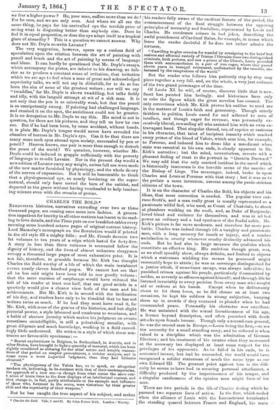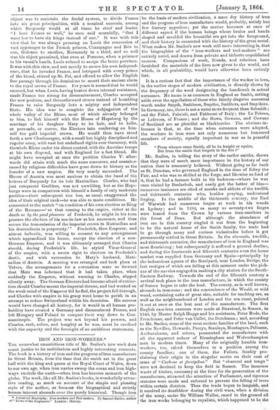CHARLES THE BOLD.*
EXHAUSTIVE histories, narratives extending over two or three thousand pages, are coming once more into fashion. A genera- tion impatient for brevity in all other matters has learnt in its read- ing to love details, and the Times puts on our breakfast-tables every morning some hundred octavo pages of original current history. Lord Macaulay's monograph on the Revolution would if printed
in the old style fill a mighty folio ; and Mr. Froude devotes two fat volumes to ten years of a reign which lasted for forty-five.
A story in less than three volumes is accounted below the dignity of history, and the lives of almost unknown clergymen occupy a thousand large pages of most exhaustive print. It is not fair, therefore, to grumble because Mr. Kirk has thought Charles the Bold worthy of a life of which the main instalment covers nearly eleven hundred pages. We cannot but see that all he has said might have been told in one goodly volume ; that the mere excision of surplusage would have reduced the toil of his reader at least one half, that one good article in a quarterly would give a clearer view both of the man and his achievements. But Mr. Kirk is in accord with the inclination of his day, and readers have only to be thankful that he has not written twice as much. If he had they must have read it, for Mr. Kirk, with none of the genius of the historian, and but slight pictorial power, a style laboured and cumbrous to weariness, and a habit of obscure jocosity which makes his judgment on events sometimes unintelligible, is still a painstaking annalist, with great diligence and much knowledge, working in a field exceed- ingly little understood. He writes in a style of which these sen- tences are favourable specimens: —
" Recent explorations in Belgium, in Switzerland, in Austria, and in other States, have brought to light a quantity of material, which has been rightly considered as claiming for the chief actors and notable tmosac- Eons of that period an ampler presentment, a stricter analysis, and in some cases a more impartial iudgment, than they had hitherto obtained."
"The physiognomy of the Valois has, so to speak, an altogether modern air, indicating, in its contrast with that of their contemporaries, the approach of a new era—a change from what seems the were con- t ntion of brute force to the finer displays of an intellectual contest, and that change is, in fact, partly attributable to the example and influence of those who, foremost in the arena, were victorious by their greater skill and the superiority of their weapons."
But he has caught the true aspect of his subject, and makes
* Charks the Bold. Vole. I. and IL By John Foster Kirk. London : Murray.
his readers fully aware of the cardinal feature of the period, the commencement of the final struggle between the opposing principles of monarchy and feudalism, represented by Louis and Charles. He condemns crimes in bad jokes, describing the awful punishment of Cardinal Balue, for example, in terms which leave the reader doubtful if he does not rather admire the torturer,
" Unwilling to give occasion for scandal by consigning to the brief but zealous and effectual custody of Tristan l'Hermite these two distinguished criminals, both prelates, and one a prince of the Church, Louis provided them with accommodation in a pair of iron cages, where they passed eleven years in tranquil retirement, undisturbed by the tumults, un- harassed by the temptations of the world."
But the reader who follows him patiently stop by stop may piece together a very full, and, on the whole, a very just estimate of the two grand personages of the time.
Of Louis XI. he will, of course, discover little that is new. Scott has painted him lovingly, and historians have only to robe the figure which the great novelist has created. The only corrections which Mr. Kirk proves his outline to need are in the matters of Louis's faith and generosity. Though utterly faithless in politics, Louis cared for and adhered to men of intellect, and though eager for revenue, was personally ex- cessively liberal, rewarding all who assisted him with an even ex- travagant hand. That singular thread, too, of caprice or rashness in his character, that taint of incipient insanity which marked every prince of the blood of Valois, which sent him, for example, to Peronne, and induced him to dress like a mendicant when state was essential to his own ends, is clearly apparent in Mr. Kirk's narrative ; but the mind, nevertheless, reverts with a pleasant feeling of trust to the portrait in " Quentin Durward."
We may add that the only marked incident in the novel which is historically inaccurate is the horrible scene of the murder of the Bishop of Liege. The messenger, indeed, broke in upon Charles and Louis at Peronne with that story ; but it was as to the prelate a niers invention, current among the panic-stricken citizens of the town.
It is on the character of Charles the Bold, his objects and his ideas, that most correction is needed. The popular view out- runs Scott's, and a man really great is usually represented as a passionate wilful fool, who used, as Count of Charolais, to shoot at plumbers working on the roofs, and, as Duke of Burgundy, loved blood and violence for themselves, and was in all but power an ordinary and a bad specimen of the feudal noble. Mr. Kirk's picture is far more moderate, and therefore far more pro- bable. Charles was indeed through life a haughty and passionate man, with a long memory for insult or injury, and a sombre satisfaction in cruelty whenever cruelty distinctly advanced his ends. But he had also in large measure the qualities which constitute an effective king. His ambition though great, was, as we shall speedily show, always definite, and limited to objects which a statesman wielding the means he possessed might reasonably hope to attain ; he was as sovereign distinguished for a justice which, if sometimes savage, was always inflexible ; he punished crimes against his people, particularly if committed by nobles, as severely as offences against himself; and through life he listened invariably to every petition from every man who sought aid or redress at his hands. Except when lie deliberately chose to let them loose, as he did choose on at least two occasions, he kept his soldiers in strong subjection, hanging them up in crowds if they ventured to plunder when he had commanded peace. Personally his character was excellent.
He was untainted with the sexual licentiousness of his age, a licence beyond description, and often punished with death attacks upon female honour. Though only a second-rate general, he was the second man in Europe,—Louis being the first,—to see
the necessity for a small standing army, and he reduced it when raised to a discipline which was the admiration of German Electors ; and his treatment of his estates when they murmured
at the necessary tax displayed at least some respect for the privileges of his opponents. As lie failed in his ends, he is accounted insane, but had he succeeded, the world would have recognized a soldier statesman of much the same type as our own Edward III. The greatest point against him is the diffi- culty lie seems to have had in securing personal attachment, a difficulty produced by the imperiousness of his temper, and a singular carelessness of the opinion men might form of his acts.
There are two periods in the life of Charles during which he
pursued two separate lines of action. In the first, which ended when the alliance of Louis with the Lancastrians terminated the standing quarrel between France and England, his main
made France too strong for dismemberment, Charles accepted surnames. No name is as common in England as Smith, setting the new position, and thenceforward strove instead of humbling aside even the appellation of those who faintly disguise ancestral
tbewhole Rhine under his direct control, with the Austrian troops " From whence came Smith, all be he knight or squire, at his own disposal, and with England for a fast friend. He But from the smith that forgeth in the fire ?"

















































 Previous page
Previous page